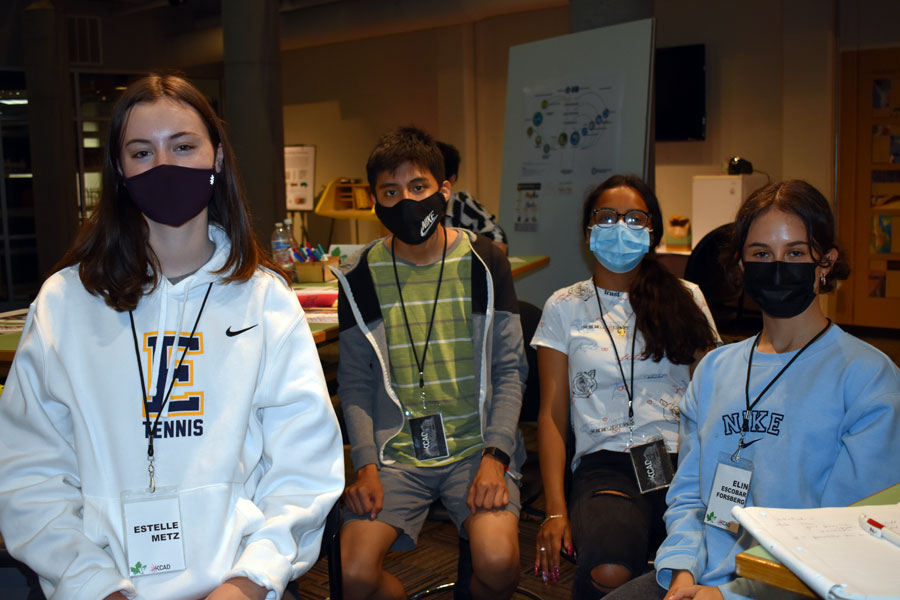All Districts — If a homeowner only uses a lawnmower for a few hours a week, is it really necessary for every homeowner to own one?
For a group of West Michigan students participating in the Wege Prize High School Collaborative Studio, the answer to that “wicked problem” was to create a mobile community tool shed that would house a number of commonly needed household tools such a lawnmower, table saw and hammers, as well as a 3D printer that could create missing parts. Items in the mobile tool shed would be checked out on a schedule, giving borrowers an idea when they would be able to use needed items.
“I like the mobility aspect,” said industrial designer Tom Newhouse, who was a preliminary judge for the program. “Also, having a schedule gives a person an idea of when they might be able to mow their lawn.
“But if you are going to incorporate a 3D printer, there is a technical aspect, in that you may need an expert.”
Where and how are the experts going to be available? Newhouse asked, adding that the group also needed to consider how the tools would be distributed.
“His comments definitely have us looking at how to make the project better,” said Jordan Fridsma, a student at the Grand Rapids Museum High School. “We are going to have to tweak it as to how the tools will be distributed, along with the knowledge of how to use the tools provided.”

Problem-Solving, High-School Edition
Since 2013, the Kendall College of Art and Design of Ferris State University has hosted the Wege Prize, an international design competition for college students. The program is designed to inspire and teach solutions that support a circular economy, a closed-loop system that minimizes the use of resource inputs and the creation of waste.
“What we really want is for the students to look across different disciplines and work together in biodiversity, like ecosystems do, to come up with a solution,” said Gayle DeBruyn, Kendall professor and Wege Prize organizer.
From Aug. 5-13, 15 high-school students representing nine regional schools in West Michigan attended the inaugural workshop at the Grand Rapids Kendall campus.
“This is something that I have been interested in since sixth grade, when I attended Zoo School. I really believe that it is important and critical that we look at wicked problems and explore what solutions there are and how we can use those solutions.”
— Miguel Hernandez, City High School 11th-grader
Supported by Kendall’s Wege Center for Sustainable Design and the Wege Foundation, the students researched and learned about what were referred to as “wicked” problems. Those were defined as social or cultural problems that are difficult or impossible to solve because of incomplete, contradictory or changing requirements that can be hard to recognize.
The workshop was broken into four phases: introductions and project development, feedback from competition judges, applying feedback and revising projects, and presentation to judges. Guest teachers discussed a variety of topics from biodiversity to how to present a project.
Said DeBruyn: “We wanted to show them how to eat that elephant one step at a time, that this is doable and not to be reluctant because it seems overwhelming, when it really is not.”
From Foster Care to Fashion Waste
“This is something that I have been interested in since sixth grade, when I attended Zoo School,” said City High School 11th-grader Miguel Hernandez. “I really believe that it is important and critical that we look at wicked problems and explore what solutions there are and how we can use those solutions.”
Miguel’s group focused on homelessness. For many children in foster care, the transition from foster care to independent living can be difficult, and those students can have a higher rate of poverty, said East Grand Rapids 11th-grader Estelle Metz, one of Miguel’s project partners.
“We are looking at creating a long-term, sustainable place where the children in foster care could make an easier transition into independent living,” Estelle said. “This would provide (anything from) aid in voting rights to mental health. Basically, it would be a bridge from foster care to becoming an independent adult.”
The third group focused on the fashion industry and how they could create a line of clothing that would be made from plant-based materials purchased from local farmers, allowing for the clothing to be composted when no longer needed. The line, said Museum High School 11th-grader Perla Hinojosa, would feature basic pieces that could be mixed and matched.
“It is a great opportunity to explore a problem, learn the background and then participate in finding a solution,” said East Grand Rapids 11th-grader Elin Escobar Forsberg, who worked on the fashion project. “I feel like I have gotten more education on real-world problems in this (challenge) than I have in the real world.”
Win or lose, many of the students said they felt like winners having had the opportunity to work on skills such as problem-solving and teamwork.
“It has been a really good experience,” Estelle said. “It has been interesting to work with experts. I learned about how to present, which is something that I can use at school. Also, I got to make new friends.”













